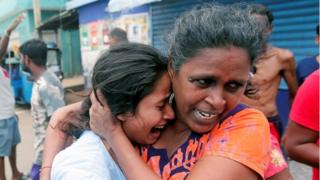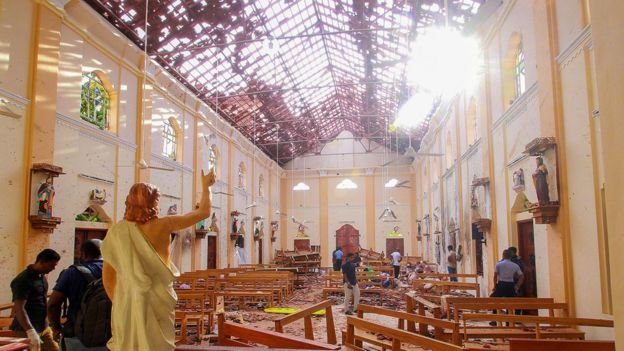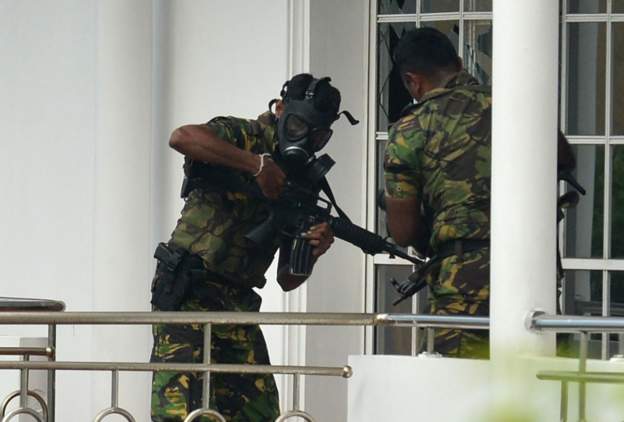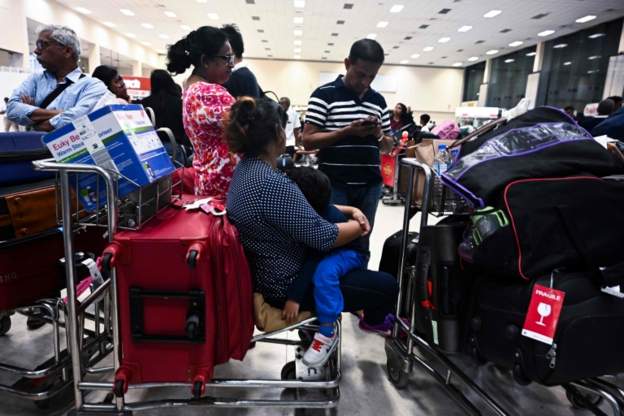Sri Lanka attacks: What we know about the Easter bombings
 Image copyright
Reuters
Image copyright
Reuters
On Easter Sunday, Sri Lanka was rocked by a series of bombings that killed more than 300 people at churches and top-end hotels.
It is the deadliest violence in the country since the end of the civil war a decade ago. Most of the victims are believed to be Sri Lankans, but at least 31 foreigners are also among the dead, with 14 still unaccounted for.
The government says a little-known jihadist group was behind the attacks and police have made a number of arrests. However, the Islamic State (IS) group claimed the attack on Tuesday via its news outlet. On Tuesday IS released photos of the alleged attackers via its news outlet.
Here is what we know so far:
How did the attacks unfold?
The first reports were at about 08:45 (03:15 GMT) on Sunday 21 April. Six blasts took place within a short space of time.
Three were at churches - in the Kochchikade district of the capital, Colombo; in Negombo, to the north; and in the eastern city of Batticaloa. The other three blasts rocked the Shangri-La, Kingsbury and Cinnamon Grand hotels in Colombo.
Two further explosions were reported later as police searched for suspects - one in Dehiwala in southern Colombo, and another one near the Colombo district of Dematagoda, during a police raid.
The police have not given details about how many people died at each of the blast sites.
Late on Sunday, an improvised explosive device was found and disposed of close to the country's main airport, near Colombo.
And on Monday another blast rocked a street near a church in the capital. Police were attempting to defuse explosives in a vehicle used by the attackers when it blew up.
According to police sources, an attack on a fourth hotel failed and helped lead police to the Islamist group now blamed for the assault.
How many people are dead?
On Tuesday, the official death toll given by authorities rose to 310 with more than 500 injured.
Hundreds of Sri Lankan families are in mourning. One of the first victims was celebrity chef Shantha Mayadunne. Other Sri Lankans killed included members of church congregations and staff at the hotels targeted.
The confirmed international casualties are from the UK, Denmark, Portugal, India, Turkey, Australia, the Netherlands, Japan, the US and China.
Among the dead are three children of Danish billionaire Anders Holch Povlsen, owner of the Bestseller clothing chain and the largest shareholder in clothing giant Asos.
Who was behind the attacks?
On Monday Sri Lankan authorities said they believed a little-known local militant Islamist group known as National Thowheed Jamath (NTJ) was to blame. They said officials were investigating whether it had had "international help".
On Tuesday, Islamic State said it had carried out the attacks. The group released a photo and video of the men it claims were responsible via its self-styled news outlet Amaq.
In the photo, all but one of the men can be seen with their faces covered. Some are holding knives.
The video showed the eight men pledging allegiance to Islamic State.
In a statement, Amaq said "members of the US-led coalition and Christians in Sri Lanka" had been targeted.
BBC security correspondent Gordon Corera says that while IS in the past has claimed attacks it was not involved in, their statement is being taken seriously due to the number of deaths.
The choice of targets is more in line with IS ideology than with traditional types of communal violence seen in Sri Lanka, he adds.
Addressing reports that officials had had prior intelligence of forthcoming attacks, Prime Minister Ranil Wickremesinghe said: "We must look into why adequate precautions were not taken. Neither I nor the ministers were kept informed."
Police have arrested 40 people and said all the attacks were carried out by suicide bombers. Those arrested have not been publicly identified.
Sri Lanka's history and religion
Sunday's attacks were the worst ever against Sri Lanka's small Christian minority, who make up just 7% of the 21 million population.
Theravada Buddhism is Sri Lanka's biggest religion, accounting for about 70% of the population. Hindus and Muslims make up around 12% and 10% of the population respectively.
The attacks are Sri Lanka's deadliest act of violence since the end of the 26-year civil war in 2009.
The war is thought to have killed between 70,000 and 80,000 people and ended with the defeat of the Tamil Tigers, who had fought for independence for the Tamil minority.


